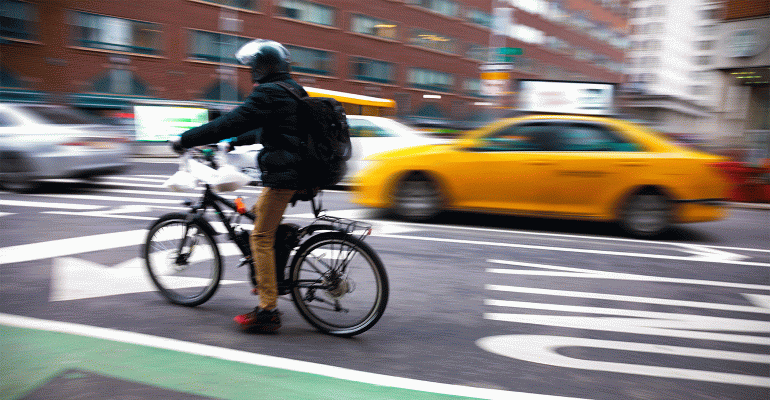New York City Councilman Mark Gjonaj on Thursday introduced a long-anticipated package of bills that would regulate operations for third-party restaurant-delivery marketplaces, including Grubhub, DoorDash, UberEats and Postmates.
Described as a first round of such legislation, the six-bill package is the result of a 10-month long inquiry by the council's Small Business Committee, which included an oversight hearing to understand the impact of food delivery apps on the restaurant industry.
The committee is headed by Gjonaj, who has been vocal about his concerns over the unbalanced relationship between restaurants and their third-party marketplace partners. Most recently, the councilman held a hearing on the impact of ghost kitchens.
The New York City Council is not the first legislative body to propose regulations for third-party marketplaces. Still, the bills, including a commission cap and license to operate, are unique, and the legislation —if approved — would have the power to impact the nearly 27,000 restaurants that operate in the city.
"Restaurants are having a hard enough time competing in New York City as it is between skyrocketing property taxes and labor costs," said Andrew Rigie, executive director of the NYC Hospitality Alliance. "They can't survive if they're also being exploited by companies like Grubhub, Seamless and others. Hopefully, this package of legislation will help level the playing field and give some basic rights to restaurants."
In response to the legislation Max Rettig, head of public policy at DoorDash wrote in statement: "We look forward to continuing to work with local elected officials as we strive to foster a culture of transparency and collaboration that we believe will best serve all of our users and the entire DoorDash community."
Included in the legislation is a bill to cap the commissions restaurants pay to third-party marketplaces at 10%. Restaurants across the country have frequently complained about commissions of up to 30%.
A spokesperson for Grubhub, which also operates Seamless in New York City, argued the cap would ultimately hurt restaurants.
"This arbitrary cap defies common sense — if you tell New York restaurants that they can only sell pizza for a quarter and coffee for a nickel, no one will serve pizza or coffee. Simply put, this bill will slash business to mom-and-pop restaurants and hurt consumers in the process," said the Grubhub spokesperson.
While the bill as it stands now is a firm cap on these commissions, a spokesperson for Gjonaj's office said that the bill could be adjusted for circumstances such as marketing fees.
The spokesperson for Grubhub noted that a portion of the company's commission is based on marketing on the platform. "To cap marketing that could also mean a cap on Google Ad words, Facebook promotions, etc."
Another bill would require companies running third-party marketplaces to be licensed to operate in New York City. The fee would be no less than $500, paid biannually. The license is not about the charges, but rather about the authority it gives the city agencies to ensure best practices and to revoke or suspend a permit should a company act in an egregious way, said the councilman's spokesperson.
The summary of the bill states: "Application terms and fees would be determined by the Department of Consumer and Worker Protection. The department could refuse to issue or renew a license, or suspend or revoke a license, if the third-party food delivery services violates the conditions of the license, including engaging in misleading advertising or deceptive trade practices. Third-party food delivery services who violate license conditions may also be subject to penalties determined by the department."
The bill proposing that third-party marketplaces disclose any commissions and fees imposed on participating restaurants seems aimed at making consumers more aware of the cost of delivery services to restaurants. The disclosure must occur “when a final price is disclosed to a customer, and before a transaction occurs,” and be made “in plain and simple language and in a conspicuous manner.”
Another bill prohibiting third-party marketplaces from dictating the menu prices restaurants may charge on food-and-beverage orders seems aimed at helping restaurant owners make up for the fees they pay to marketplaces. Some third-party marketplaces, including Grubhub, include stipulations on pricing in some of their contracts.

A Grubhub contract that includes stipulations on pricing.
The bill proposing that third-party marketplaces may not charge restaurants for "a telephone order that does not result in an actual transaction between the covered establishment and a customer during such telephone call," stems from a long-running dispute over phone calls made through Grubhub's app.
Previously, Grubhub was the target of a class-action lawsuit filed by a restaurant operator who claimed the delivery service charged restaurants for calls made through the app, even when they didn't result in orders. In January, Grubhub announced a "common sense" ordering plan where customers are prompted to press #1 to place an order #2 for everything else.
Finally, the City Council also announced a bill that would require the city's Department of Health and Mental Hygiene, or DOHMH, to establish rules that would decrease the risk that food packaged by restaurants for delivery is tampered with before reaching the customer, which may include requiring tamper-evident packaging. It's unclear if the onus for would fall solely on restaurants to comply with this legislation.
Said Rigie of the NYC Hospitality Alliance, "We will research tamper-proof packaging prior to the public hearing and will raise any concerns that may arise, but our immediate understanding is that a tape or another inexpensive mechanism could be used to fasten bags closed in a way that would alert the customer if the bag was opened."
Contact Gloria Dawson at [email protected]
Follow her on Twitter: @GloriaDawson
Updated February 27, 2020: This article has been updated with comment from DoorDash





